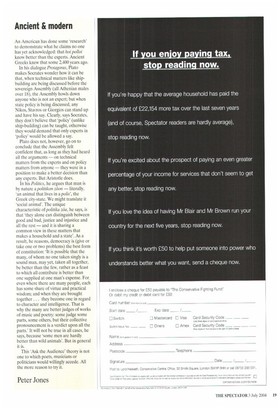Ancient & modern
An American has done some 'research' to demonstrate what he claims no one has yet acknowledged: that hoi polloi know better than the experts. Ancient Greeks knew that some 2,400 years ago.
In his dialogue Protagoras, Plato makes Socrates wonder how it can be that, when technical matters like shipbuilding are being discussed before the sovereign Assembly (all Athenian males over 18), the Assembly howls down anyone who is not an expert; but when state policy is being discussed, any Nikos, Stavros or Giorgios can stand up and have his say. Clearly, says Socrates, they don't believe that 'policy' (unlike ship-building) can be taught, otherwise they would demand that only experts in 'policy' would be allowed a say.
Plato does not, however, go on to conclude that the Assembly felt confident that, as long as they had heard all the arguments — on technical matters from the experts and on policy matters from anyone — they were in a position to make a better decision than any experts. But Aristotle does.
In his Politics, he argues that man is by nature a politikon zoon — literally, 'an animal that lives in a polls', the Greek city-state. We might translate it 'social animal'. The unique characteristic of polinica zoa, he says, is that 'they alone can distinguish between good and bad, justice and injustice and all the rest — and it is sharing a common view in these matters that makes a household and a state'. As a result, he reasons, democracy is (give or take one or two problems) the best form of constitution: 'It is possible that the many, of whom no one taken singly is a sound man, may yet, taken all together, be better than the few, rather as a feast to which all contribute is better than one supplied at one man's expense. For. even where there are many people, each has some share of virtue and practical wisdom; and when they are brought together . . . they become one in regard to character and intelligence. That is why the many are better judges of works of music and poetry: some judge some parts, some others, but their collective pronouncement is a verdict upon all the parts.' It will not be true in all cases, he says, because 'some men are hardly better than wild animals'. But in general it is.
This 'Ask the Audience' theory is not one to which poets, musicians or politicians would willingly accede. All the more reason to try it.
Peter Jones


































































 Previous page
Previous page